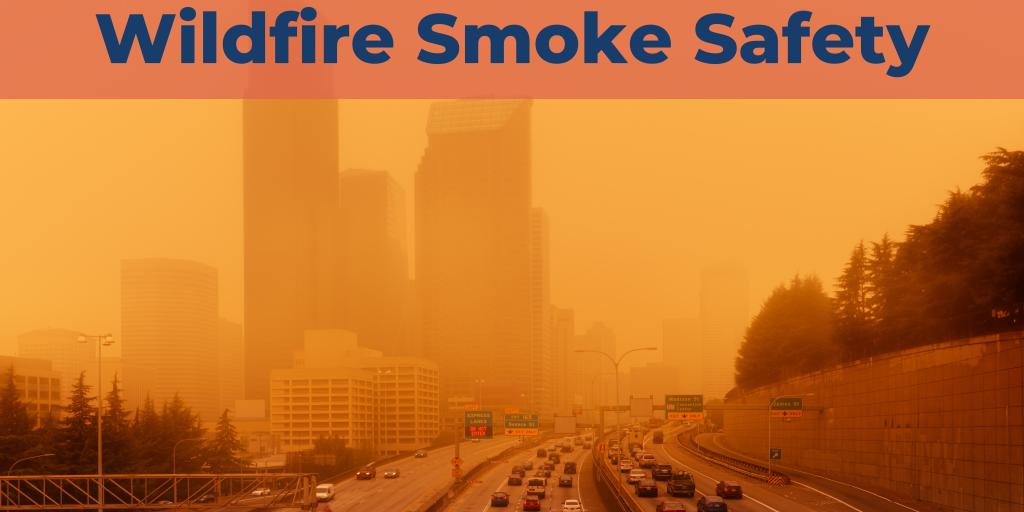Wildfire Smoke Safety for Seniors

As wildfire season continues throughout Canada, it is important to ensure that you and those around you are staying healthy. According to the Red Cross, seniors are among the topmost vulnerable populations for health problems due to wildfire smoke exposure.
What can seniors do to preserve their health when air quality is poor?
Listed below are a list of resources that can help seniors navigate the current air quality in Edmonton.
Link: Red Cross - Breathing Emergencies: Wildfire Smoke and Poor Air Quality - Canadian Red Cross Blog
Highlights:
Symptoms resulting from wildfire smoke exposure can include:
- Headaches
- A mild cough
- Production of phlegm
- Sore and watery eyes
- Nose, throat and sinus irritation
More serious but less common symptoms of wildfire smoke exposure can include:
- Dizziness
- Chest pains
- Severe cough
- Shortness of breath
- Stridor (noise on inspiration caused by laryngeal irritation)
- Wheezing (including asthma attacks)
- Heart palpitations (irregular heartbeat)
If you are experiencing symptoms, it’s important to limit your exposure by reducing or stopping outdoor activities and staying indoors. Limit outdoor activities and strenuous physical activities as much as possible. If experiencing more serious symptoms, talk to a healthcare provider or seek urgent medical attention.
How to protect yourself from wildfire smoke and poor air quality
- Limit outdoor activity as much as possible
- Use a portable air purifier to filter the air in your home
- Keep your windows closed
- Ensure your furnace filter is clean and changed monthly during wildfire season
- Stay hydrated
- If you have a chronic health condition, work with your healthcare provider to create a management plan for wildfire smoke conditions
- Stay informed on local and regional air quality conditions
Link: Government of Alberta: Wildfire Smoke and Your Health (alberta.ca)
Highlights:
If smoke is a problem where I live, what can I do to lower my health risk?
- Close fresh air intakes from furnaces, fireplaces, or stoves.
- Turn on your air conditioning if you have it and set it to recirculate. Keep it running to help filter the air and keep your family cool. (Just remember that some air conditioning systems don't filter the air or improve indoor air quality.)
- If you have room air cleaners with high-efficiency particulate air (HEPA) filters, turn them on. Don't use air cleaners that may produce ozone. For portable air cleaners, follow all the manufacturer's instructions for changing the filter, where to place the device, and the size of room it's meant to be used in.
- Check your furnace filter often. You may need to replace it more often than usual. Upgrade your furnace filters to the highest efficiency your ventilation system can handle. They may help lower the levels of smoke and particles in the air in your home.
- Use humidifiers, which might help remove some of the smoke. The humid air can also help keep your nose and mouth moist.
- Don't use wood stoves, gas stoves, or candles because they make the indoor air quality worse. If you can, prepare foods that you don't have to cook. Cooking (especially frying and broiling) can affect the air quality in your home.
- Don't use spray air fresheners or electric fragrance dispensers because they can affect air quality.
- Don't vacuum because it stirs up particles that are already inside your home.
- Don't let anyone smoke, vape, or use e-cigarettes in your home.
What can I do if it's too warm inside my home?
When you keep doors and windows closed to keep smoke out and you don't have air conditioning, your house might get very warm. If you need to cool down, you could visit a place that is more air-tight with cooler filtered air. Examples include a shopping mall, library, community centre, or movie theatre.
What if I start to feel unwell?
When there's wildfire smoke where you live, pay close attention to your health, especially if you have heart or lung problems. Take all your regular medicines. It's a good idea to have a week's supply of medicine with you. Do everything your healthcare provider tells you to do and contact your healthcare provider if you have any health concerns, even if you don't have heart or lung problems.
If you have chest tightness, chest pain, shortness of breath, or another health emergency, call 911 or go to the nearest emergency department right away.
Link: Government of Canada - Wildfire smoke, air quality and your health: Overview - Canada.ca
Highlights:
- As wildfires burn through forests and grasslands, they produce smoke. Smoke from wildfires in forests and grasslands can be a major source of air pollution for people in Canada.
- Wildfire smoke may be carried thousands of kilometres from the fire zone. This means smoke can impact air quality in areas close to and far from the wildfire.
During wildfire smoke events, pay attention to:
- the Air Quality Health Index (AQHI)
- a scale from 1 to 10+ designed to help you understand what the air quality around you means to your health. The higher the number, the greater the health risk associated with the air quality.
- InfoSmog
- air quality advisories
- special air quality statements
This information can be found on:
- the WeatherCAN app
- local weather forecasts



